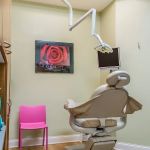How to Manage Age-Related Dental Conditions
As we age, our dental health requires more attention and care. Over the years, I’ve noticed that certain dental issues become more prevalent as we get older. Whether it’s dealing with receding gums, tooth sensitivity, or the loss of teeth, age-related dental conditions are something many of us will face. In my experience, understanding these changes and knowing how to manage them can make a world of difference in maintaining good oral health well into our later years. In this article, I’ll walk you through some common age-related dental issues and share practical tips for managing them effectively.
1. Tooth Sensitivity: A Common Concern with Age
One of the most noticeable age-related dental issues I encountered was increased tooth sensitivity. As we age, the enamel on our teeth naturally wears down, and this can expose the softer part of the tooth, called the dentin. I first started experiencing tooth sensitivity when eating cold or sweet foods, and it was a sharp reminder of how important enamel is for protecting our teeth.
To manage tooth sensitivity, I started using a toothpaste specifically designed for sensitive teeth. These toothpastes contain ingredients that help block the transmission of sensation from the tooth surface to the nerve inside the tooth. I also found that switching to a softer toothbrush helped reduce irritation. Avoiding acidic foods like citrus and vinegar also made a significant difference in minimizing sensitivity.
If your sensitivity persists, it’s a good idea to see your dentist. In some cases, they can apply a fluoride gel or a desensitizing agent to strengthen the enamel and reduce discomfort.
2. Gum Disease: Preventing and Managing Gum Recession
Another age-related condition that I became more aware of as I got older is gum recession. Over time, the gums naturally pull back from the teeth, exposing more of the tooth and even the tooth roots. This can lead to gum disease and increased sensitivity. I started noticing my gums receding and became concerned about the long-term effects, such as tooth loss.
To manage gum recession, it’s essential to practice good oral hygiene. I made sure to brush gently using a soft-bristled toothbrush, as vigorous brushing can exacerbate gum recession. Flossing daily also helps remove plaque from between the teeth and below the gumline, where gum disease often begins.
If you’re experiencing gum recession, it’s important to consult with your dentist. They may recommend treatments like deep cleanings, scaling, and root planing, or in some cases, gum grafts to restore lost gum tissue. Maintaining regular dental checkups will help catch gum disease early before it progresses further.
3. Dry Mouth: A Common Issue in Older Adults
Dry mouth, or xerostomia, is another age-related dental condition I encountered that often goes hand in hand with certain medications or medical conditions. As we age, the salivary glands can produce less saliva, leading to a dry mouth. This can make it difficult to swallow, speak, or even enjoy food, and it can increase the risk of tooth decay and gum disease because saliva plays a crucial role in neutralizing acids in the mouth and washing away food particles.
To manage dry mouth, I began using saliva substitutes and drinking plenty of water throughout the day to stay hydrated. Chewing sugar-free gum also helps stimulate saliva production. There are also special mouthwashes formulated for dry mouth, which can provide relief and help protect your teeth from decay.
If you suspect your dry mouth is caused by medication, I recommend speaking with your healthcare provider. In some cases, they may be able to adjust your medication or suggest alternative treatments to reduce the side effects.
4. Tooth Loss: Preventing and Replacing Missing Teeth
As we age, tooth loss becomes more common, whether due to decay, gum disease, or trauma. Losing a tooth can affect both the function and appearance of your smile. I’ve seen friends and family members deal with the emotional and physical challenges of tooth loss, and it’s something that should be addressed as soon as possible. Missing teeth can lead to difficulty eating and speaking, and can also cause the remaining teeth to shift, leading to additional dental issues.
To prevent tooth loss, I focused on maintaining excellent oral hygiene habits, including brushing, flossing, and regular visits to the dentist. If you already have missing teeth, there are several solutions to restore your smile, such as dental implants, bridges, or dentures. I personally opted for dental implants after losing a tooth, and the procedure has significantly improved both the function of my mouth and my confidence.
5. Changes in Bite and Jaw Function
Over the years, I’ve noticed subtle changes in my bite and jaw function. As we age, the muscles and bones in the jaw can weaken or shift, leading to bite issues and sometimes even temporomandibular joint (TMJ) pain. I remember experiencing discomfort in my jaw after chewing for extended periods, and this became more noticeable as I got older.
To manage bite and jaw issues, I began paying more attention to how I chew, avoiding overly tough or chewy foods. My dentist recommended a nightguard to wear while sleeping, which has significantly reduced the strain on my jaw. In some cases, orthodontic treatments like braces or clear aligners can help correct bite issues and improve overall jaw function.
6. Regular Dental Checkups and Professional Cleanings
One of the most important things I’ve learned in managing age-related dental conditions is the importance of regular dental checkups. Even if you’re not experiencing any noticeable issues, it’s crucial to see your dentist regularly for cleanings and exams. During my checkups, my dentist is able to spot early signs of conditions like tooth decay, gum disease, or oral cancer that may not be visible to me.
Professional cleanings are especially important as we age, as they help remove plaque and tartar buildup that can contribute to gum disease and tooth decay. I’ve found that scheduling dental cleanings every six months has helped me stay on top of my oral health and address potential problems before they become serious.







 Alameda Crossing Dental Group and Orthodontics4.0 (188 review)
Alameda Crossing Dental Group and Orthodontics4.0 (188 review) Valleywise Community Health Center - Mesa3.0 (252 review)
Valleywise Community Health Center - Mesa3.0 (252 review) Mortenson Family Dental4.0 (578 review)
Mortenson Family Dental4.0 (578 review) Hawthorne Dental and Braces3.0 (101 review)
Hawthorne Dental and Braces3.0 (101 review) Mike Shannon, D.D.S5.0 (109 review)
Mike Shannon, D.D.S5.0 (109 review) Spencer Dental & Braces4.0 (459 review)
Spencer Dental & Braces4.0 (459 review) The Importance of Oral Health Education During Pregnancy for a Healthy Pregnancy
The Importance of Oral Health Education During Pregnancy for a Healthy Pregnancy Best Tips for Brushing Your Teeth Properly for Healthy Gums: Essential Techniques for Oral Health
Best Tips for Brushing Your Teeth Properly for Healthy Gums: Essential Techniques for Oral Health Why Skipping Dental Checkups Can Lead to Bigger Oral Health Problems
Why Skipping Dental Checkups Can Lead to Bigger Oral Health Problems Advantages of Porcelain Dental Restorations
Advantages of Porcelain Dental Restorations How Can Diabetes Cause Tooth and Gum Problems? Preventing and Managing Oral Health Issues
How Can Diabetes Cause Tooth and Gum Problems? Preventing and Managing Oral Health Issues Healthy Habits for Promoting Good Oral Health and Hygiene: Tips for a Healthy Smile
Healthy Habits for Promoting Good Oral Health and Hygiene: Tips for a Healthy Smile